At a nondescript house in Arlington last summer, a showdown of cinematic proportions took place. Three women faced off against three men who’d brutally attacked and beaten them earlier. The women wore tight leather jumpsuits, elaborate sequined face makeup, and high-heeled boots. They kicked, punched, and slashed their hapless bashers with switchblades, kitchen knives, hammers, and elaborately carved ninja weapons. Sweat poured down their faces and mixed with the makeup and the blood in colorful streams.
 “You think we’re ‘tranimals’!” a blonde, curly-haired female avenger shouted at a cowering man. “But you’re the animal here!”
“You think we’re ‘tranimals’!” a blonde, curly-haired female avenger shouted at a cowering man. “But you’re the animal here!”
The word “tranimal” is a pun on what these superheroines are — transgender women, individuals who were born male but identify and publicly present themselves as female. And if the line sounds like a cheesy bit of B-movie dialogue, it is — it’s in the script for North Texas writer-director Israel Luna’s movie Ticked-Off Trannies With Knives, which filmed on location in Fort Worth, Arlington, and Dallas last summer.
The blood and the knives, of course, were fake, and this payback sequence was elaborately staged and filmed with six actors. But Luna’s tongue-in-cheek homage to exploitation films is serious in one respect: He wanted to create a drive-in movie revenge opus where the kind of people who typically make the news as hate crime victims turn the tables on their oppressors. If he achieved what he was aiming for, movie audiences would enthusiastically applaud the transgender crusaders in the classic tradition of midnight movies. Think of it as Dirty Harry — or maybe Dirty Harriet — meets The Rocky Horror Picture Show.
Luna’s dreams have been realized. Audiences have been literally cheering their support in sold-out film festival screenings in Fort Worth, Dallas, New York, Seattle, Philadelphia, and San Francisco. Ticked-Off Trannies With Knives has become an underground sensation. But the uproar has been fueled in part by some furious opposition to the film — coming not, as one might expect, from the right-wing anti-gay crowd but from a part of the transgender community itself.
Transgender activists from around the country — including Arlington’s own Kelli Anne Busey — have taken to the blogosphere and the streets to express their outrage at the movie. They say it presents a misleading and caricaturish image of transgender people, most of whom just want to live their lives in peace. It traffics in the kind of horrific violence used in real hate crimes against trans people — and Luna had the gall, they say, to use the names of two real-life victims to help promote the movie. Many of them also find the title itself offensive — the word “tranny,” they insist, is a pejorative on a par with the worst racist, sexist, and homophobic slurs.
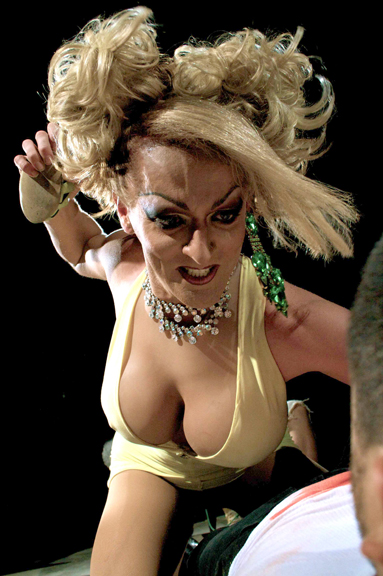 “Israel Luna wants to make money by selling the public a distorted version of our lives — a gratuitously violent ‘comedy’ in which transgender women are guilty of deceiving men they pick up in bars,” said Busey, 52, who blogs on the local web site Planet Transgender. “Anyone who wants to see a woman — best of all, a transgender woman — beaten to death with a baseball bat will enjoy this movie.”
“Israel Luna wants to make money by selling the public a distorted version of our lives — a gratuitously violent ‘comedy’ in which transgender women are guilty of deceiving men they pick up in bars,” said Busey, 52, who blogs on the local web site Planet Transgender. “Anyone who wants to see a woman — best of all, a transgender woman — beaten to death with a baseball bat will enjoy this movie.”
Luna, 38, is as astounded by the movie’s success on the national film festival circuit as he is puzzled by the widespread, passionate protests from members of the lesbian/gay/bisexual/transgender (or LGBT) community — a community he calls home.
“I’m a gay man who wrote and directed a ‘chick flick’ revenge fantasy with smart, strong transgender characters,” he said, as if listing his bona fides. “I cast real transgender women in the roles. Most of the people who say this movie makes fun of hate crimes haven’t seen it.”
The Ticked-Off Trannies debate has been covered by many national and international media outlets, including The New York Times, BBC TV, The Huffington Post, and The Drudge Report. It’s a classic example of pop culture colliding with political activism — with a North Texas twist.
Luna is a short, chatty fellow who laughs constantly and radiates eternal youthfulness. He came by his love of shock and exploitation movies early. The filmmaker grew up in the tiny Panhandle town of Wellington, about two hours southeast of Amarillo. His whole family loved movies, especially horror films, and by the time he reached junior high school he’d notched many hours watching flicks like The Exorcist, The Texas Chainsaw Massacre, Halloween, and Friday the 13th. He occasionally played with Barbie dolls as a young kid, but his idea of fun was stranding Barbie and Ken in their minivan in the backyard weeds while an imaginary killer stalked them.
Looking back, Luna now sees a connection between his burgeoning identity as a gay man and his love of horror movies.
“If you think about it, the person who survives or is one of the last to survive is the oddball in the movie, the nerd, the one who doesn’t belong,” he said. “And a lot of times, it’s a woman. I identified with that character as a gay kid.”
Not long after Luna graduated from high school, he decided he needed to leave tiny Wellington to live his life openly. Dallas seemed like the best option — close enough for visits but not so close that his family would be involved in his personal business. He began taking film classes at University of Texas at Dallas and design classes at the Art Institute of Dallas. He taught himself to use a camera and sound and editing equipment. He began to earn a living shooting private events like quinceañeras and filming demo reels and video auditions for local actors.
In 2000 he formed the production company La Luna Entertainment with business partner Toni Miller, and they began producing feature films. They’ve made five so far, including a coming-of-age tale shot in Oak Cliff (The Deadbeat Club), a gay-themed drama (R U Invited?), and a fright film about a Ouija board run amok (Is Anybody There?). Luna was writer-director on all of them. The company sold two of the no-budget features for direct-to-DVD release and made a tidy profit.
It was early 2008 when Luna began to write the script for the movie that would stir up a national ruckus. His inspiration came from news stories about hate crimes against transgender people. This group runs the spectrum from people who’ve had gender reassignment surgery and hormone treatments to those who merely dress in clothes of the opposite sex.
“I kept hearing LGBT leaders saying we should fight hate with love, that we should educate our attackers,” he said. “And my first thought was, ‘Hell, no. I don’t want to have tea with these people.’ I have a lot of transgender friends. So I decided to write a movie with a twist, one where the transgender women fight back and are just as brutal as their attackers.”
Luna conceived a film featuring five transgender women with punny names like Pinky La Trimm, Bubbles Cliquot, and Rachel Slurr. They’d be attacked and beaten in a warehouse by a trio of redneck bashers, including a long-haired psycho with a baseball bat. Three of them would survive, receive fight training from an Asian master, and ultimately lure their bashers into a trap for bloody payback. The movie would be a conscious homage to two of Luna’s favorite B-movie revenge extravaganzas — Meir Zarchi’s still-infamous 1978 splatterfest I Spit on Your Grave and 1984’s Savage Streets, in which a busty, jumpsuit-clad Linda Blair gorily avenges the murders of her best friend and sister.
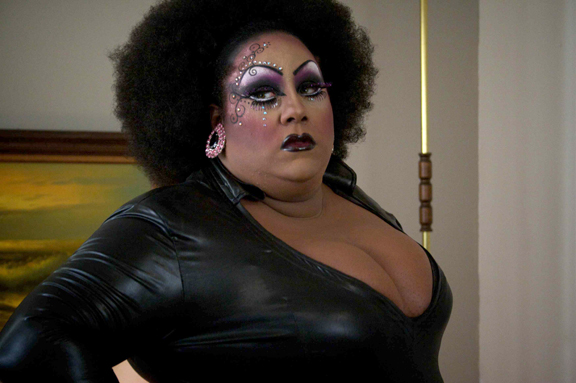 The finished script was christened with a title that would make trash auteurs Roger Corman and Jack Hill proud — Ticked-Off Trannies With Knives. While Miller went looking for financing, Luna began to approach longtime friends and associates with roles he had written for them. He wanted Fort Worth set designer, fight coordinator, and actor Tom Zembrod for the role of Boner, the scuzzy bat-wielding hillbilly villain. His friend Krystal Summers, who performs as a host and showgirl at gay clubs in Dallas, was tapped for the lead role of Bubbles Cliquot, one of the hate-crime survivors. Kelexis Davenport, a longtime Dallas drag performer, would play the “mother hen” character Pinky La Trimm. And after a series of casting changes, Willam Belli, a Los Angeles actor whom Luna had met on Facebook, drove to Texas to play the wisecracking, scene-stealing Rachel Slurr.
The finished script was christened with a title that would make trash auteurs Roger Corman and Jack Hill proud — Ticked-Off Trannies With Knives. While Miller went looking for financing, Luna began to approach longtime friends and associates with roles he had written for them. He wanted Fort Worth set designer, fight coordinator, and actor Tom Zembrod for the role of Boner, the scuzzy bat-wielding hillbilly villain. His friend Krystal Summers, who performs as a host and showgirl at gay clubs in Dallas, was tapped for the lead role of Bubbles Cliquot, one of the hate-crime survivors. Kelexis Davenport, a longtime Dallas drag performer, would play the “mother hen” character Pinky La Trimm. And after a series of casting changes, Willam Belli, a Los Angeles actor whom Luna had met on Facebook, drove to Texas to play the wisecracking, scene-stealing Rachel Slurr.
Financing was an issue almost up to the first day of shooting. After much deliberation, Anne Gibson, an 84-year-old retired professor of French, agreed to supply virtually the film’s entire budget, which Miller, the producer, said was less than $100,000. The former longtime University of Texas at Arlington faculty member is a cinema enthusiast, a screenwriter, and maker of short films, and she knew Luna as an acquaintance through other screenwriters. While not a fan of violent films herself, she was a big supporter of what she saw as the movie’s affirmation of transgender people. In the end, she was inspired to underwrite the film by her memories of a transgender employee at UTA who could not afford gender reassignment surgery.
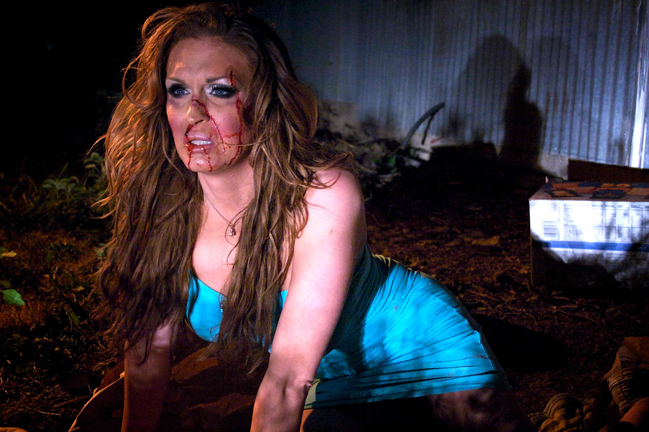 “Slasher flicks are not my thing,” said Gibson, who is listed in the film credits as executive producer. “We live in a world that wants more and more of everything, and that includes movie violence. But a lot of young straight men will see this movie because of its genre. And even though it’s essentially a fantasy film, they’ll see that a category of people known as ‘transgender’ exists and, I hope, ask themselves, ‘How does society treat these people?’ ”
“Slasher flicks are not my thing,” said Gibson, who is listed in the film credits as executive producer. “We live in a world that wants more and more of everything, and that includes movie violence. But a lot of young straight men will see this movie because of its genre. And even though it’s essentially a fantasy film, they’ll see that a category of people known as ‘transgender’ exists and, I hope, ask themselves, ‘How does society treat these people?’ ”
The film was shot in 19 days plus one continuous 27-hour stretch. The grueling “trans-bashing” sequence was filmed between 7 p.m. and 7 a.m. in a warehouse just north of downtown Fort Worth. In the scene, Summers, Belli, and Davenport (as well as co-stars Erica Andrews and Jenna Skyy) encounter Zembrod and his henchmen, who savagely attack the women. The characters played by Andrews and Skyy are killed. With film lights running and air conditioning turned off due to the demands of sound recording, the cast and crew were drenched in sweat most of the time.
Summers had been somewhat reluctant to take the lead role of Bubbles Cliquot. “I didn’t want to exploit myself for a cheesy movie,” she said. “And then I read the script, and said yes right away. It was cheesy in all the right ways.”
Still she requested a closed set for the scene in which Zembrod, as the crazed trans-basher Boner, menaces her with a baseball bat festooned with a clump of bloody hair from his last victim. He stands over her with a twisted grin and taunts her: “Why do you go around dressed up like a girl, man?”
“The dialogue he delivered in that scene was too intense,” she said. “It was too believable. I couldn’t do it in front of everybody.”
That fits Luna’s vision of the scene. “I wanted the bashing scene to be uncomfortable and hard to watch,” he confirmed. “I didn’t want to sugarcoat these crimes. Plus it had to be tough so the audience is really rooting for the women to get their revenge.”
After the women recover, they go to a Zen fightmaster (played by Dallas comic actor and club performer Richard D. Curtin) for the training in focus and discipline that they need to exact their revenge. These so-called “Asian Gardens” scenes were shot at the Weston Gardens in Fort Worth, a nursery center with extensive English–style gardens. The August sun burned the fishnet pattern of Belli’s hose into his legs during the long outside shoot.
Finally, the big showdown, pitting the three transgender heroines against Boner and his two sleazy buddies, was filmed in an empty house next to Gibson’s home in Arlington. Her neighbor was selling the home, and he agreed to let them use it. Because the movie had exceeded its shooting schedule and rented equipment had to be returned shortly, the violent retribution scene was shot during one 27-hour stretch. Again, actors and crew sweated buckets because the air conditioner couldn’t be used — plus Summers, Belli, and Davenport wore long, specially tailored leather jumpsuits and high-heeled boots. They wielded guns, switchblades, and enormous, specially designed ninja blades to get their pound of flesh from the hapless bashers.
Zembrod once worked as a performer in live-action stunt shows like Batman and Lethal Weapon for the Six Flags family of theme parks. He choreographed the fight moves with all three of the heroines, none of whom had previous experience with the knife work and hand-to-hand combat they would have to do in front of Luna’s cameras.
“If you’re not careful, people can really get hurt doing fake fight choreography,” Zembrod said. “Plus there was the heat of a Texas summer, and everyone’s attitudes came out a little more. But the ladies picked it up fast. Most of them are club performers, after all — they knew how to work long hours in high heels, where to place their feet, and how to stay balanced.”
Fake blood made from Karo syrup and food coloring flowed freely. Gibson’s house next door served as a dressing room and break station. The white-haired Gibson maneuvered around easily in her wheelchair with a digital video camera in hand, filming hours of behind-the-scenes footage that Luna plans to use in the DVD release.
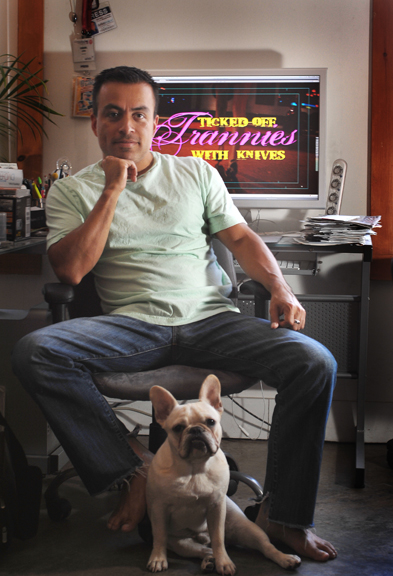 After the movie wrapped, Israel edited it himself over the following six months. If he was lucky, he figured, Ticked-Off Trannies might be accepted by a couple of film festivals around the country and then get sold to DVD. But the game changer came earlier this year when New York’s prestigious Tribeca Film Festival — co-founded by Robert De Niro — accepted the film as part of its “Midnight Movie” series. Word spread quickly throughout the North Texas transgender community, and then the shit hit the worldwide blogosphere.
After the movie wrapped, Israel edited it himself over the following six months. If he was lucky, he figured, Ticked-Off Trannies might be accepted by a couple of film festivals around the country and then get sold to DVD. But the game changer came earlier this year when New York’s prestigious Tribeca Film Festival — co-founded by Robert De Niro — accepted the film as part of its “Midnight Movie” series. Word spread quickly throughout the North Texas transgender community, and then the shit hit the worldwide blogosphere.
Kelli Anne Busey is an Arlington-based transgender activist who founded the support group Dallas Transgender Advocates and Allies and blogs about local and national LGBT issues on her site Planet Transgender. She has long straight hair, high cheekbones, and a manner that is soft-spoken but intense. Now 52, the Connecticut native and former long-haul truck driver was born a male but realized 23 years ago that she could no longer live as one. In 1987, she began what would be two rocky back-and-forth decades of dressing as both genders.
“That’s pretty typical of a transgender person,” she said. “You go out and buy the clothes and the makeup and swear you’ll never dress as a man again. But then something happens — you get kicked out of a public restroom, say — and you give away all the women’s clothes to Goodwill and start the cycle of shame over again.”
By 2006, she was living in Texas and had made the decision to live as a woman full time. She began hormone treatments. She hired a transgender lawyer and petitioned a family court judge to change her name and her “gender marker” — that is, her legal gender status. The judge issued a court order declaring that in the eyes of Texas, Kelli Busey was now legally a woman.
Busey had known Luna for a few years and was aware that he was writing a script called Ticked-Off Trannies before it went into production last summer. Busey and some others in the transgender community consider the word “tranny” to be an insult. At one point, Busey had launched an internet campaign to get the Dallas Voice to stop the paper’s occasional use of the word in its stories. (Other transgender people have reclaimed the word the way some women, African-Americans, and gays and lesbians have embraced hateful slurs against them as streetwise badges of honor.)
 After the movie was shot and Luna had an edited version he liked, he created a trailer for the film and put it on the internet. If the “t” word in the title wasn’t enough to piss off many transgender bloggers, Israel’s decision to use the names of real-life trans-murder victims in a dedication at the beginning of the trailer really stoked outrage. He invoked Angie Zapata, who was beaten to death with a fire extinguisher in Colorado in 2008, and Jorge Mercado, who was stabbed, burned, and decapitated in Puerto Rico in 2009.
After the movie was shot and Luna had an edited version he liked, he created a trailer for the film and put it on the internet. If the “t” word in the title wasn’t enough to piss off many transgender bloggers, Israel’s decision to use the names of real-life trans-murder victims in a dedication at the beginning of the trailer really stoked outrage. He invoked Angie Zapata, who was beaten to death with a fire extinguisher in Colorado in 2008, and Jorge Mercado, who was stabbed, burned, and decapitated in Puerto Rico in 2009.
Many trans advocates saw Luna as using the victims of horrific real-life hate crimes to sell a self-described “exploitation movie” with comic elements. In addition to expressing opposition on their own blogs, Busey and her friends started a Facebook campaign condemning the film. Bloggers around the world quickly weighed in.
Luna still defends his use of the murder victims’ names in the original trailer. “Angie and Jorge’s names would’ve been seen by audiences who would’ve never heard about what happened to them,” he said.
Oddly enough, Busey has never seen the movie she’s so vehemently opposed to. On at least two occasions, Israel asked her to watch the film and give him her opinions — good, bad, or indifferent. She declined. Many people have asked her how she can passionately advocate, on the web and on the streets, against a film she’s never seen. Busey explains by describing some dark experiences from her own life and how they directly related to Ticked-Off Trannies’ controversial trailer. In the past, she said, two people brutalized her because of her trans status — a stranger who attacked her on the street one night and a man with whom she fell into a destructive relationship.
“I saw the trailer with the man [actor Zembrod] and the baseball bat,” she said. “If you’ve ever been in a relationship with someone who has total control over you — I mean life-and-death control — you’ll recognize the look he had in his eyes. It made me physically ill. I didn’t think I could make it through the whole movie.”
Luna and Miller knew nothing of Busey’s past, only that she and other bloggers around the country were relentless in trying to get as many people as possible to denounce Ticked-Off Trannies. The filmmakers consulted with the Gay and Lesbian Alliance Against Defamation, or GLAAD — the national gay media watchdog group — on the best ways to court transgender people as a niche audience and how to use inclusive language in the marketing campaign. As far as Luna and Miller could tell, their relationship with GLAAD was going well.
Once Tribeca accepted Ticked-Off Trannies and the movie entered the national spotlight, criticisms from transgender advocates reached a fever pitch. Busey and many others around the country had long since contacted GLAAD to register their disapproval. Finally, GLAAD weighed in.
The group released a call-to-action statement that read, in part: “Because of its position as a transgender film, viewers unfamiliar with the lives of transgender women will likely leave this film with the impression that transgender women are ridiculous caricatures of ‘real women.’ It demeans actual transgender women who struggle for acceptance and respect in their day-to-day lives … .”
GLAAD asked Tribeca to pull the film from its schedule. Tribeca refused, in a brief statement that read in part: “Tribeca is proud of its ongoing commitment to bring diverse voices and stories to its audiences and looks forward to the film’s premiere at our festival next month.”
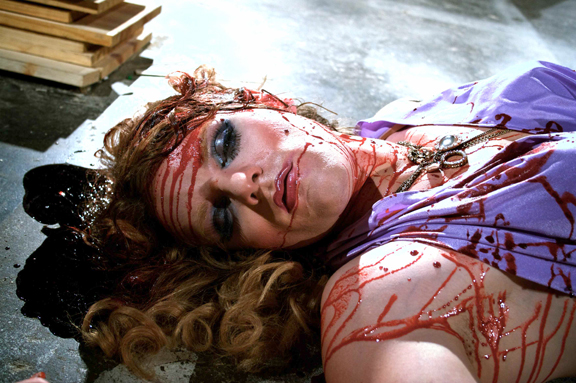 Luna was flummoxed by GLAAD’s actions. “I set out from the beginning to make an empowering movie for people who’ve been attacked and put down,” he said. “But I never claimed it would be a realistic depiction of the trans community. I based the characters in the movie on five people in my head, not five real transgender people I knew.”
Luna was flummoxed by GLAAD’s actions. “I set out from the beginning to make an empowering movie for people who’ve been attacked and put down,” he said. “But I never claimed it would be a realistic depiction of the trans community. I based the characters in the movie on five people in my head, not five real transgender people I knew.”
He offered two concessions that, he said, were his way of communicating that he cared about the trans community’s concerns: He removed Zapata and Mercado’s names from the movie trailer, and he replaced the “a” in “Trannies” with an asterisk. The official title was then Ticked-Off Tr*nnies With Knives.
Opponents were not pacified. At the four sold-out Tribeca screenings in New York City, where Luna and several North Texas cast members walked the red carpet, about 15 to 20 transgender activists and their supporters waved signs with photos of hate-crime victims and handed out literature on violence against transgender people. The demonstrations were peaceful, but the protesters scored a photo and a small story in The New York Times.
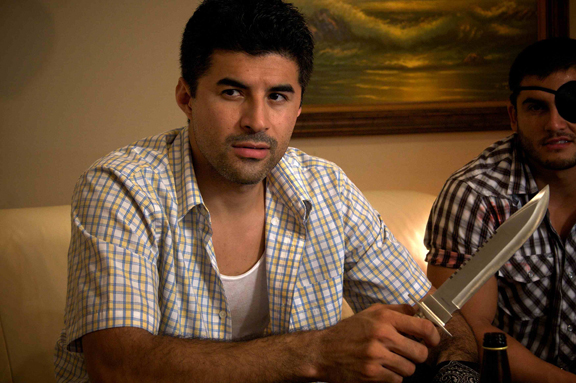 “I understand that groups like GLAAD exist for a reason,” Luna said, “but when political correctness leads to censorship — which is what GLAAD was asking for — then that’s un-American.”
“I understand that groups like GLAAD exist for a reason,” Luna said, “but when political correctness leads to censorship — which is what GLAAD was asking for — then that’s un-American.”
The newly rechristened Ticked-Off Tr*nnies with Knives went on to screen at another festival in Seattle and a small horror film festival in San Francisco, but no other LGBT festival would touch the film after GLAAD’s call to action. Finally, Fort Worth’s Q Cinema decided to give the movie its Southwest premiere in June. (A gay festival in Philadelphia later booked it as well.) Q Cinema artistic director Todd Camp has known Luna for many years, and Q had screened several of the writer-director’s previous movies. Camp even made a brief visit to the Fort Worth warehouse set while the bashing scene was being filmed.
When a GLAAD representative called Camp and asked him to reconsider screening the film, he refused.
“People asked me if I felt brave for showing the movie,” said Camp with a small chuckle. “I said no, I would’ve felt stupid if I hadn’t shown it. It’s received more publicity than any other gay movie this year. And an important conversation about violence against transgender people has emerged from the controversy. One of the roles of a film festival is to encourage that kind of dialogue.”
To that end, Q Cinema held a panel discussion after one of the screenings. Camp and Luna were on the panel, as well as three transgender women and one transgender man. They asked Busey to be on the panel, but she declined. The moderator was Curtis Smith, pastor of Arlington’s Trinity Metropolitan Community Church, which is part of the national MCC denomination. Many of their members are LGBT folks.
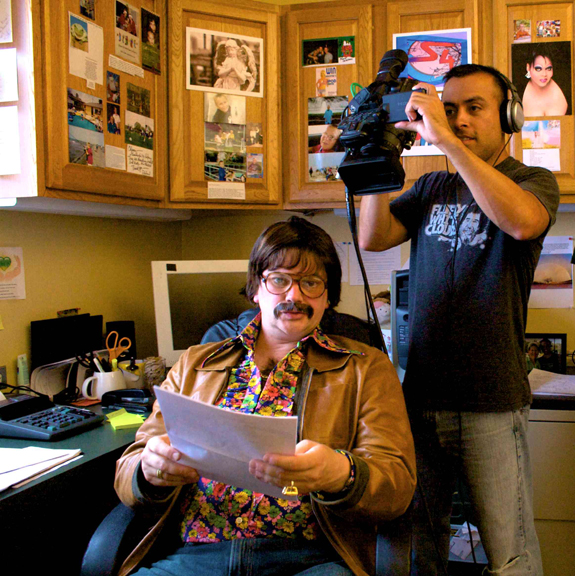 Smith was, to the say the least, in a difficult position — he was a board member of Q Cinema, but Busey was also a member of his flock at Trinity. She and other trans parishioners had convinced a small coalition of North Texas MCC churches to take out a full-page, $1,800 ad in the Dallas Voice criticizing Ticked-Off Tr*nnies With Knives for its use of the “t” word and its “stereotypical” depiction of transgender women. As panel moderator, Smith’s goal was to stand squarely in the middle of the fracas and try to build a bridge between sides.
Smith was, to the say the least, in a difficult position — he was a board member of Q Cinema, but Busey was also a member of his flock at Trinity. She and other trans parishioners had convinced a small coalition of North Texas MCC churches to take out a full-page, $1,800 ad in the Dallas Voice criticizing Ticked-Off Tr*nnies With Knives for its use of the “t” word and its “stereotypical” depiction of transgender women. As panel moderator, Smith’s goal was to stand squarely in the middle of the fracas and try to build a bridge between sides.
“I wasn’t there to condemn the film,” said Smith, who also declined to see it as a gesture of solidarity with the protesters. “I was there to stand with members of the local transgender community who had problems with the film and wanted to voice their concerns about it.”
By all accounts, the panel discussion was cordial and informative. One of the trans women who’d initially been involved in protests against the film and who, like Busey, had also been a victim of violence, turned to Luna and offered him a public apology. Once she’d actually seen the film, she told the audience, she found it to be a vivid and affirming experience.
Before the discussion, Smith also participated in a small protest outside the Rose Marine Theater, where Q Cinema held the festival. The minister handed out literature while Busey drew chalk crime scene outlines on the sidewalk and wrote the names of Angie Zapata and Jorge Mercado beneath them.
Camp, who has screened many documentaries and features about transgender life at the festival, is a little perplexed by the pushback from some members of the LGBT community.
In the worldwide blogosphere, “I was called a misogynist and a trans-basher [for showing the film],” said Camp. “Like a lot of gay and lesbian people, it’s hard for me to wrap my head around what the transgender community goes through. It’s not my experience. But I just don’t believe that Ticked-Off Tr*nnies promotes violence against trans people. At worst, it delivers the message, ‘Don’t fuck with a trans person, or you might get killed.’
“Watching it with an audience is an amazing experience,” he said. “When the tables are turned, and the women start kicking ass, the audience goes wild rooting for them.”
Ultimately and perhaps predictably, the efforts by GLAAD and national transgender activists have only fueled publicity about the film and helped it reach a wider audience. Just last month, Luna and Miller signed a deal with the Philadelphia-based Breaking Glass Pictures to distribute Ticked-Off this fall as a midnight movie at art house theaters around the country and then release it on DVD with extras — including the footage that Gibson shot in her home.
And the controversial “a” is back — for both the midnight movie and DVD releases, “Tr*nnies” has become “Trannies” again. One of the major promotional points being considered for both campaigns is: “The Movie That GLAAD Didn’t Want You to See.”
For her part, Busey doesn’t regret one moment of the blog and street protests that she and transgender activists across the country have staged. She still believes that the movie’s trailer is proof that Ticked-Off Trannies is harmful to trans people, who have to endure the stares and comments of strangers and an ever-present, implicit threat of violence because of who they are.
“All of the people who stood up and stood against tyranny will be remembered long after this movie is forgotten,” she said. “We couldn’t just stay quiet about it and hope it went away. The representation of trans people in the mass media is very small, and this movie overshadows our efforts to live our lives as normal human beings.”
Summers, who plays sexy avenger Bubbles Cliquot, knows Busey and respects her opinion. But Summers said acting in the movie has affected her own identity in surprising and positive ways.
“I was afraid that if the movie became popular, I’d have to give interviews and become a spokesperson for the trans community,” she said. “I didn’t want to do that. I live a very quiet suburban life [outside of her club performances]. But as I’ve gone to different film festivals around the country, I found out I was more comfortable talking about these issues than I ever thought I would be. It’s been very empowering for me.”
Luna is now working on an hour-long documentary about transgender women and their complicated experiences, including violence. Although he’s thrilled that Ticked-Off Trannies With Knives has encountered so much unexpected success, it’s clear he still feels hurt that some members of the LGBT community have vilified him for making what he sees as a movie with a strong pro-trans message. The fact that the transgender women portrayed in the movie are flamboyant, angry, vengeful, and even a little cartoonish is a plus in his mind. He draws comparisons to his own experiences as an ethnic minority with popular culture.
“When I was a kid, the only Latino role models I had growing up were Speedy Gonzales and Cheech Marin [from Cheech and Chong],” he said. “People would always say, ‘They don’t accurately reflect Latinos,’ and I was like, ‘Of course, they don’t.’ But they’re entertaining and likable, and maybe they’re the first Latino characters some people have seen.
“To me, that’s not a bad place to start.”












This post will assist the internet users for creating new website or
even a blog from start to end.